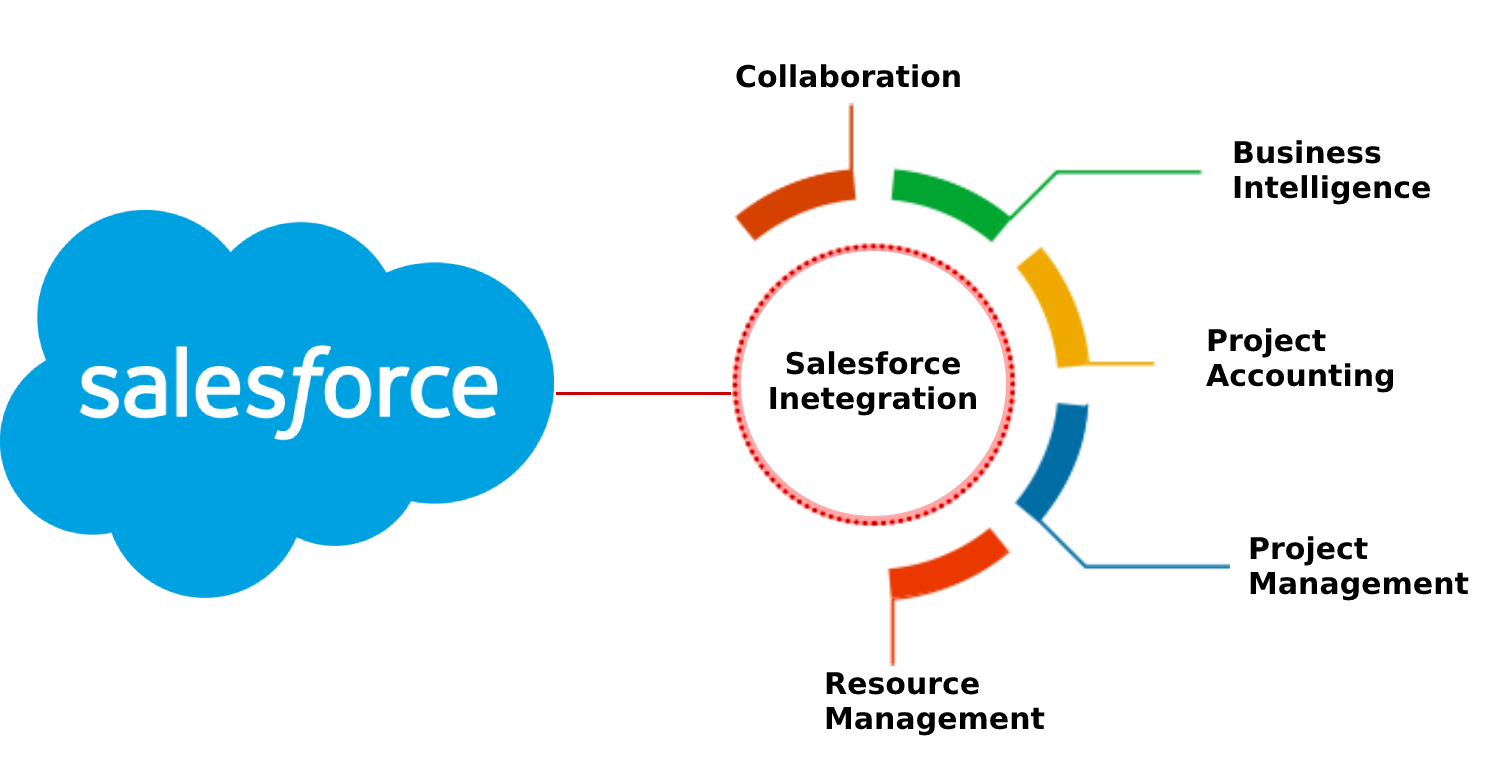Salesforce is an exemplary platform. Businesses from different industry verticals are embracing and leveraging this cloud-based CRM. The Salesforce CRM platform is a wide platform, and most companies are still exploring its potential.
One of the best features of Salesforce is its integration capabilities. Through Salesforce integration services, a company can excellently expand its opportunities for growth.
Salesforce integration with a third-party application is a unique feature where CRM users satiate their specific requirements without getting stuck anywhere.
One important thing to keep in mind before you integrate Salesforce with 3rd party apps is that you hire an experienced Salesforce consulting company. It is essential for the smooth and error-free Salesforce integration with 3rd party apps. It will also improve the quality of output.

What is Salesforce Integration?
The process of merging the functionalities and data of Salesforce with another app so that users could get a unified experience, such a process is known as Salesforce integration. Through the Salesforce integration service, a user can enjoy mixed features of both platforms.
Salesforce integration gives users a centralized platform to work on, wherein they can execute required operations without switching the platforms.
Challenges in Salesforce Integrations
Salesforce integration is a complex process. It requires a business to keep in mind the paradigm of integration. In its absence businesses can face certain challenges. Some of the most important challenges that businesses face at the time of Salesforce integration with 3rd party apps are as follows:
- There could be a change in Salesforce infrastructure because of a change in API. The change in API also leads to changes in corporate policies & other facts on which you don’t have control. Just make sure you maintain the authenticity of API requests at all costs.
- The Salesforce integration process is delicate. It will be challenging for users to align technologies because of the involvement of the delicate customization.
- Another important concern in the Salesforce integration process with third-party apps is security. If the company is big, the concern is evident as it might affect the Salesforce environment. The same goes with a small level company as well.
- In case if there is the smallest difference between connection points and business needs, then you have no other option but to transfer to the new plan.
Benefits of Salesforce Integration with Third Party Applications
The process of integration might be complex and require the guidance of an experienced Salesforce integration services company. The integration of Salesforce with third-party apps has multiple advantages; some of them are as follows:
Easy to Use – Salesforce integration with third-party apps brings ease of use for CRM users. Be it a small company or a large enterprise, be it an expert or someone naïve, Salesforce integration is a piece of cake for all if one gets acquainted with the process.
Streamline Processes
The integration of Salesforce with third-party applications brings collaboration between different departments of an organization. It will expedite sales, marketing, and other operations that lead to improved efficiencies, better accessibility to information, and better data processing,
Building Network
Another ability of Salesforce that makes it stand above its contemporaries is its strong functionality of building a robust customer network. The strong backend system of Salesforce CRM helps you gather information about your prospects across the channel. It will help understand the requirements and build a customer network easily.
Secure Revenue
In the absence of proper traceability, businesses often end up losing a substantial amount of revenue. But when you integrate Salesforce CRM with a third-party app, it will improve the chance of businesses to garner & secure greater ROI.
Salesforce Integration with Different Types of Third-Party Applications and the Best Practices
Salesforce integration with third-party apps is a complex process; you definitely do not want it to get more complex. There are multiple applications available on the AppExchange platform which you can integrate with your Salesforce CRM.
Some of the most common integration with third-party providers include payment processors, tax processing, ratings and reviews, email services, and many more.
Here are some of the most used technologies that businesses want to integrate with Salesforce:
- Certona for personalization
- PayPal for payment
- Olapic for social
- Adyen Payment Services for payment
- Tealium for tag management
- CyberSource for payment
- Experian for address verification
- Bazaarvoice for ratings and reviews
- Avalara for tax
- PowerReviews for ratings and reviews
Now that we have understood the types of third party apps that can be included in Salesforce, it’s time for you to understand the best practices for Salesforce integration with third party applications:
Identify Your Business Needs
The Salesforce application platform AppExchange is compact with more than four thousand applications. It will be confusing for businesses to choose the right one. There are many apps listed on the platform which you might feel optimum for your business but not every app is meant for you.
Therefore, you must understand the core requirements of your business. When you choose an app, think about how that application will help you achieve the goals of your company. It will prevent you from the process of unwanted integration.
Team Involvement
Never avoid your team involved in the process of the Salesforce integration process with a third-party app. It’s the team that will ultimately have to work on the application.
Select the team members that are essential to be a part of the integration process. Intimate them about the process of integration, and do not forget to entertain their feedback at the same time.
If the team is unsatisfied with the integration process, there is no use in executing it any further. Therefore, in the integration process, one person’s decision will not be a wise choice.
Competitor Research
Another important practice that one should follow before initiating Salesforce integration is conducting competitor research. It is the foremost and most crucial part of Salesforce integration with the third-party application process.
Check your competitors, understand what application they have integrated, what benefits they are reaping after its integration, what purpose it solves for them.
Then analyze your business requirements, see if the same application will solve your problem just like it did for your competitors. Chances are if they have positively impacted your competitors then it will impact in the same manner for your business as well.
If you or your team feels that it will impact your business adversely then you should consider other applications for the integration.
Understand the Application
Before you finalize any app for integration purposes, it is strictly advisable to go through the product details thoroughly.
Understand its features and its functionality. Try to grasp the know-how of the product and how it will be suitable for your business.
The applications available on the app exchange platform are built to perform certain actions. Those actions might not prove useful for your business. Therefore, you should always go through product details.
Along with the product details, you should also check the terms and conditions of the product you wish to integrate with your legacy system. It will help keep us informed about the upcoming challenges.
Data Type Identification
Another important practice to follow at the time of Salesforce integration with a third-party application is data type identification. It is necessary to recognize the data type for the smooth execution of the integration process.
The data which is essential for you to recognize include, the behaviour of an API, expected data volume, quantity of object fields, and also the flow of integration.
Once you recognize the data type, it will become easy for you to make an enhanced and effective plan for Salesforce integration with third-party applications.
Conclusion
Salesforce integration is a complex process where you integrate different tools with your legacy system for smooth business execution. The well-implemented Salesforce integration will be a boon for a business. It will facilitate ease of use, simplify business processes, build customer networks, and secure greater revenue.
Henceforth, always hire experienced Salesforce integration services companies for the best results. Choose FEXLE as your Salesforce integration partner. It has an experienced team of certified Salesforce integration consultants who have hands-on experience in different integration projects.









